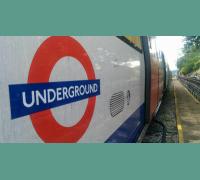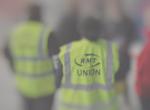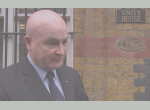RMT demands halt to job cuts and scrapping of driverless trains plans after horrific Clapham South Incident
Tube union RMT today demanded a halt to the massive LU job cuts programme and to the lethal idea of driverless trains after the publication of the official report into the dragging incident at Clapham South Station last year. RMT has also called for all platforms for to be fully staffed.
On March 12th 2015 , a female fell under a northern line train when her coat was court in the door and was dragged 60ft. It was only the actions of station staff and the train driver who saved her life.
The RAIB (railway accident investigation branch) report that was published yesterday confirmed:
*Despite sub standard CCTV images in the drivers cab, it was the driver who noticed there was a problem and applied the emergency brake.
*The design of the platform/train interface equipment CCTV provided to the driver meant the driver couldn't see the lady was trapped before he had moved
*When platforms are busy, drivers cannot see the whole of the platform train interface and cannot be sure that nothing is trapped.
*London underground rules stipulate that a train should not move until its safe to do so, however due to camera equipment placement , and passenger flo this in a lot of circumstances is impossible to be achieve without the train operator being given assistance from the platform. The RMT have over the last 2 years highlighted where this problem exists and have urged LUL to take the nessacary action to remedy this issue. Up to now, no sites on the northern line that have this problem have been remedied
*The doors "Safe edge system" that is supposed to stop the train from moving when there is something in them didn't respond, owing to the coat being too thin.
*The member of station staff on the platform used the standard emergency procedure to discharge traction current immediately, saving the lady from being electrocuted
*One of the recommendations of the report is that of a previous incident at Holborn in Feb. 2014 where the recommendation was to ensure LUL staff platforms to ensure safe dispatch of trains. Although some stations in the peak have platform staff, the majority do not.
RMT General Secretary Mick Cash said.
"This report shows yet again that the idea of driverless trains is inherently unsafe and will lead to people getting killed or injured. It was only the actions of the driver who stopped the train that prevented a tragedy at Clapham South and that alone proves the need for trains to have a driver.
"In addition, the actions of the station assistant in discharging traction current ensured the passenger wasn't electrocuted and proves the need for properly staffed stations- something LUL don't share having cut nearly a 1000 safety-critical station staff with the threat of more massive budget cuts to come.
"RMT demands a halt to the lethal mix of driverless trains and fewer staff and also demands implementation of the RAIB recommendation to ensure all platforms are fully staffed."
- Read the RAIB report Passenger trapped in train doors and dragged at Clapham South station 12 March 2015 here
- Press releases on this site are taken from www.rmt.org.uk.
- 9949 reads
> RMT National News
- ‹ previous
- 4 of 12
- next ›





